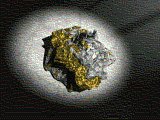Minerals
Where to get them and what to do with them
 There
are 4 types of minerals in the Echo Cluster: Neutronium (fuel), Tritanium, Duranium and
Molybdenum. Neutronium is a super dense mineral that is fed into a ship's engine core and
consumed by the engines as fuel for propulsion. Unfortunately this mineral is far too
unstable to be used in the construction of starship components. To be carried on starships
as fuel the Neutronium needs to be stored in a magnetic bubble/inertial dampening system
to help it remain stable. Thus the amount of fuel a starship can carry is limited by the
size of the MB/ID field it can generate, instead of cargo space.
There
are 4 types of minerals in the Echo Cluster: Neutronium (fuel), Tritanium, Duranium and
Molybdenum. Neutronium is a super dense mineral that is fed into a ship's engine core and
consumed by the engines as fuel for propulsion. Unfortunately this mineral is far too
unstable to be used in the construction of starship components. To be carried on starships
as fuel the Neutronium needs to be stored in a magnetic bubble/inertial dampening system
to help it remain stable. Thus the amount of fuel a starship can carry is limited by the
size of the MB/ID field it can generate, instead of cargo space.
 Tritanium is an extremely adamantine and durable mineral that is easily
processed into starship and fighter hulls and hull components. When utilised in this
manner Tritanium is capable of resisting intense heat and temperatures. Duranium is a very
rigid and strong mineral that is used to form the framework and superstructures of
starships. It is also utilised in the armour skin of starbases and freighters. Molybdenum
is a very heavy superconductive mineral that is primarily employed as high power energy
wave guides. This means that it is mainly used to form all of the power transfer conduits
in the starship, its engines, and weapon systems. Due to the nature of the mineral, in
general, the Molybdenum requirement varies with the technology level of the component
being built.
Tritanium is an extremely adamantine and durable mineral that is easily
processed into starship and fighter hulls and hull components. When utilised in this
manner Tritanium is capable of resisting intense heat and temperatures. Duranium is a very
rigid and strong mineral that is used to form the framework and superstructures of
starships. It is also utilised in the armour skin of starbases and freighters. Molybdenum
is a very heavy superconductive mineral that is primarily employed as high power energy
wave guides. This means that it is mainly used to form all of the power transfer conduits
in the starship, its engines, and weapon systems. Due to the nature of the mineral, in
general, the Molybdenum requirement varies with the technology level of the component
being built.
There are two requirements for the ability to procure minerals for use in your empire. First you need a planet and secondly you need mineral mines. You will find that all unexplored planets will have a small amount of minerals sitting on the surface of the planet. This diminutive supply is pushed up through the surface of the planet by volcanic or seismic activity in the planet’s crust. It is not advisable to try to rely on these minerals alone to supply your starbases, so you will find it necessary to construct mineral mines.
 Mineral
mines are the only structure in the VGA Planets game system that are capable of extracting
minerals from the planets core. Mines cost one supply unit and four megacredits each and
the number you are allowed to construct is limited by the number of colonists present on
the planet. These mines will extract minerals from the ground until the mineral supplies
in the planet's core are depleted. How fast the mineral supplies are depleted depends on
the amount of minerals present, the amount of mines you build and on the mineral density.
Minerals inside planets' cores come in varying densities, ranging from very scattered to
"in large masses". For very scattered mineral supplies you will need many mines
to drill the minerals to the planet's surface, whereas you will need less mines to get to
minerals in high concentrations. Once you are in orbit around a planet not colonized by
anyone, your ship can do a mineral survey. This survey will tell you the amount and
concentration of the minerals in the planet's core.
Mineral
mines are the only structure in the VGA Planets game system that are capable of extracting
minerals from the planets core. Mines cost one supply unit and four megacredits each and
the number you are allowed to construct is limited by the number of colonists present on
the planet. These mines will extract minerals from the ground until the mineral supplies
in the planet's core are depleted. How fast the mineral supplies are depleted depends on
the amount of minerals present, the amount of mines you build and on the mineral density.
Minerals inside planets' cores come in varying densities, ranging from very scattered to
"in large masses". For very scattered mineral supplies you will need many mines
to drill the minerals to the planet's surface, whereas you will need less mines to get to
minerals in high concentrations. Once you are in orbit around a planet not colonized by
anyone, your ship can do a mineral survey. This survey will tell you the amount and
concentration of the minerals in the planet's core.
It can be advantageous or even necessary to build a large number of mines on a planet. There is one thing that needs to be considered as you choose the number of mines to build on your planets; at some point the planet will run out of minerals and the mines become useless. Even so, the mines will always influence the happiness level of the natives so building hundreds of mines may not always be smart (or necessary).
NEXT: Natives |